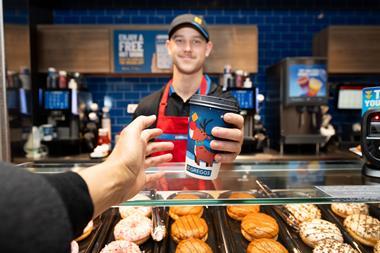Real Good Food has announced it is to move its HQ and that it now expects to make a loss in the current financial year.
The troubled bakery giant, which operates businesses including Renshaw and Haydens, today (23 October) said its margins have been badly hit by commodity cost hikes and disruption to production during site redevelopment.
As a result, the board expects to report a loss before tax for the year to 31 March 2018. This follows a string of profit warnings from the business (see Timeline below).
The business reported a £5.8m loss in the 12 months ending 31 March 2017 despite a £7.8m year-on-year increase in group sales to £108.2m. The company said the loss was down to factors including the effect of currency exchange on key commodity prices, and poor financial control of central costs.
Real Good Food (RGF) said its group and head office costs had been too high, and that it would be moving its head office from London to Wavertree, Liverpool. It is also reviewing overheads in its Cake Decoration and Food Ingredients divisions, which includes R&W Scott.
The move follows a management shake-up that saw the departure of founder and executive chairman Pieter Totté. RGF said the new management team had spent the past 10 weeks reviewing the company’s operations to “begin the process of rebuilding profitability”.
The company said each of its three divisions had experienced good sales growth in the first half of the current financial year, with Cake Decoration up 6%, Premium Bakery up 10% and Food Ingredients up 28% on a like-for-like basis. Total sales had grown 13% in the period.
%%Quote_9%%
“This revenue growth, however, is not currently being translated into greater profitability where H1 performance has been disappointing compared to the board’s previous expectations, particularly in September,” reported RGF.
Margins in the Premium Bakery division – which includes Haydens – had been “considerably” below previous expectations, as a result of commodity price increases, especially butter, as well as labour inefficiencies and materials waste during site redevelopment and investment. RGF added that the investment in Haydens to increase blast freezing capability and install an automated yum-yum line was progressing well, and that the management team was now focused to ensure the “necessary returns on this investment can be made in the future”.
The company said the Cake Decoration and Food Ingredients divisions were also behind expectations in September and in the first half of the year as a whole, and that these divisions are currently undergoing a full review of overheads.
Announcing it expects to make a loss in 2018 financial year, the board said it would give further guidance in its interim results in December when it will have more information about RGF’s most important trading period, which runs from now until Christmas.
RGF added that its three largest shareholders – NB Ingredients, Omnicane International Investments and certain funds managed by Downing LLP – remained committed to supporting the business.
Real Good Food timeline
1 August:
- RGF announces earnings for 2017 will be £2m, around £3m lower than previously forecast, and that profits in 2018 would be lower than expected.
- RGF also reveals that payments for consultancy services made to executive chairman Pieter Totté and non-executive director Peter Salter had not been disclosed in transaction notes for accounts in 2014 to 2016, but had been accounted for.
- Salter, chairman of RGF audit and remuneration committees, resigns.
8 August:
- Founder and executive chairman Pieter Totté resigns and steps down from the board with immediate effect.
- Non-exec director Pat Ridgwell becomes interim chairman, while non-exec director Christopher Thomas becomes executive director.
- Finance director David Newman is replaced by Harveen Rai, but remains with the company for a changeover period.
- New non-executive director Hugh Cawley joins the board to head RGF’s audit committee, while non-exec director Judith Mackenzie becomes head of the remuneration committee.
16 August
- RGF secures a £2m overdraft facility with Lloyds Bank after a re-forecasting exercise finds a “short-term working capital requirement” as the business builds up stock ahead of Christmas and proceeds with previously announced investment programmes at Renshaw and Haydens.
29 August
- RGF further reduces profit expectations for 2017 to £1m.
14 September
- RGF says it is committed to improving its corporate governance and reporting, admitting standards had been below those investors “might reasonably expect”, adding it is “committed to rectifying this important aspect of operations and disclosure”.
21 September
- Shareholders agree to give the business a £4m short-term debt facility
2 October
- RGF reports a £5.8m loss in the 12 months ending 31 March 2017, despite a £7.8m year-on-year increase in group sales to £108.2m. The loss is attributed to factors including the effect of currency exchange on key commodity prices and poor financial control of central costs.
































No comments yet